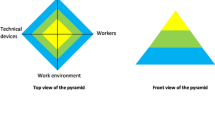Abstract
The shift from the traditional to the modern operational risk assessment and management forms in modern complex sociotechnical systems reflects some transitions from a human-focused perspective to a systemic-focused perspective. A key feature, in the later, is that when a human error is found, it is taken as the starting point for wider analysis of a system and not as the conclusion as it so often is in the human-focused perspective. This paper contributes with a comprehensive review of scholarly work aiming at assessing and elaborating on theoretical foundations of the developments that have been taking place within high-risk industries. Some interesting distinctions could be found, mainly, between realist positions and constructivist epistemologies. Both developments show the relevance of taking into account the philosophical antecedents of applied research in explaining the modern trends and how this is valuable toward new paradigms to resolve risk assessment and management issues relating to complex systems, particularly when the dynamics of human, technological, and organizational issues take into perspective.
Access this chapter
Tax calculation will be finalised at checkout
Purchases are for personal use only
Similar content being viewed by others
References
Hoyland S, Aase K (2008) An exploratory study on human, technological and organizational interactions with in health care: safety science monitor http://ssmon.chb.kth.se/vol12/1hoyland.pdf. Accessed 20 Jun 2012
Dekker S (2006) The field guide to understanding human error. Ashgate, Aldershot
Rasmussen J (1986) Information processing and human–machine interaction: an approach to cognitive engineering. North-Holland, New York
Rasmussen J (1997) Risk management in a dynamic society: a modelling problem. http://www.sciencedirect.com/science/article/pii/S0925753597000520. Accessed 03 Mar 2012
Reason J (1997) Managing the risks of organizational accidents. Ashgate, Rarnham
Heirich WH (1941) Industrial accident prevention. Mcgraw- Hill, New York
Rasmussen J (1990) Human error and the problem of causality in analysis of accidents. http://rstb.royalsocietypublishing.org/content/327/1241/449.short Accessed 12 Feb 2012
Feyerabend P (1975) How to defend society against science. http://anarcosurrealisti.noblogs.org/files/2010/10/Feyerabend-Paul-How-to-defend-society-against-science.pdf Accessed 15 Feb 2012
Kuhn T (1970) The structure of scientific revolutions. The University of Chicago Press, Chicago
Popper K (1963) Conjectures and refutations. Routledge, New York
Woods D, Johannesen L, Cook L, Sarter N (1994) Behind human error: cognitive systems, computers and hindsight. http://www.dtic.mil/cgibin/GetTRDoc?Location=U2&doc=GetTRDoc.pdf&AD=ADA492127 Accessed 21 Feb 2012
Dekker S (2002) The field guide to human error investigations. Ashgate, Aldershot
Reason J, Hobbs A (2003) Managing maintenance error. Ashgate, Aldershot
Garland DJ, Wise JA, Hopkin VD (1998) Hand book of aviation human factors. CRC Press, Mahwah
Woods D (2003) Discovering how distributed cognition systems work. In: Hollnagel E (ed) Handbook of cognitive task design. Lawrence Erlbaum Publishers, London
Simon H (1996) The sciences of the artificial. MIT Press, Cambridge
Woods D, Cook R (2002) Nine steps to move forward from error. http://csel.eng.ohio-state.edu/woods/error/9steps_forward.pdf. Accessed 15 Feb. 2012
Perrow C (1984) Normal accidents: living with high-risk technologies. Basic Books, New York
Hollnagel E, Woods DD, Leveson N (2006) Resilience engineering: concepts and precepts. Ashgate, Aldershot
Leveson N (2004) A new accident model for engineering safer systems. http://www.sciencedirect.com/science/article/pii/S092575350300047X. Accessed 13 Feb 2012
Wallace B, Ross A (2006) Beyond human error: taxonomies and safety science. CRC Press, New York
Gardner H (1985) The mind’s new science: a history of the cognitive revolution. Basic Books, New York
Le Coze JC, Pettersen K (2008) Is resilience engineering realist or constructivist? http://www.resilience-engineering.org/RE3/papers/Le_Coze_Pettersen_text.pdf. Accessed 14 Mar 2012
Author information
Authors and Affiliations
Corresponding author
Editor information
Editors and Affiliations
Rights and permissions
Copyright information
© 2015 Springer International Publishing Switzerland
About this paper
Cite this paper
Abraha, H.H., Liyanage, J.P. (2015). Review of Theoretical Foundations for Risk Minimal Operations in Complex Sociotechnical Systems: The Role of Human Error. In: Lee, W., Choi, B., Ma, L., Mathew, J. (eds) Proceedings of the 7th World Congress on Engineering Asset Management (WCEAM 2012). Lecture Notes in Mechanical Engineering. Springer, Cham. https://doi.org/10.1007/978-3-319-06966-1_1
Download citation
DOI: https://doi.org/10.1007/978-3-319-06966-1_1
Published:
Publisher Name: Springer, Cham
Print ISBN: 978-3-319-02461-5
Online ISBN: 978-3-319-06966-1
eBook Packages: EngineeringEngineering (R0)




